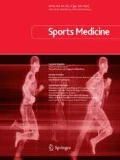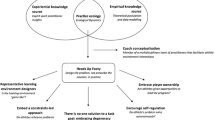Abstract
Traditional talent identification and development programs have sought to identify and select the most promising children as athletes of the future, to provide them with specialised training and preparation for expert performance in sport from an early age. Traditional models of talent identification and development tend to be linear, emphasising the numbers of hours spent in specialised training. However, major concerns have been raised by evidence emerging on psycho-emotional and physical issues with early specialisation programmes, and negative associations with wellbeing and mental health. More contemporary models of talent development emphasise a deep integration of specialised training with more general enrichment of athleticism. This integrative process enhances self-regulation processes of perception and action, as well as emotional control and social interactions, all of which underpin sports performance at elite and sub-elite levels. Here, we discuss insights and principles of contemporary models of pedagogy, such as Nonlinear Pedagogy (NLP) and the Athletic Skills Model (ASM), which offer valuable frameworks for talent development. We conclude by considering implications of adopting such principles for developing athlete functionality in specific performance environments.


Similar content being viewed by others
References
Vaeyens R, Gullich A, Warr R, et al. Talent identification and promotion programmes of Olympic athletes. J Sports Sci. 2009;27(13):1367–80.
Baker J, Cobley S, Fraser-Thomas J. What do we know about early sport specialization? Not much! High Abil Stud. 2009;20(1):77–89.
Ericsson A, Krampe T, Tesch-Römer C. The role of deliberate practice in the acquisition of expert performance. Psychol Ver. 1993;100:363–406.
Coutinho P, Mesquita I, Fonseca AM. Talent development in sport: a critical review of pathways to expert performance. Int J Sports Sci Coach. 2016;11:279–93.
Roetert P, Woods B, Jayanthi A. The benefits of multi-sport participation for youth tennis players. ITF Coach Sport Sci Ver. 2018;26:14–7.
Davids K, Araújo D. Innate talent in Sport: beware of an organismic asymmetry: comment on Baker & Wattie. Current Issues Sport Sci. 2019;4:102.
Phillips E, Davids K, Renshaw I, et al. Expert performance in sport and the dynamics of talent development. Sports Med. 2010;40:271–83.
Rudd J, Pesce C, Strafford B, et al. An ecological dynamics rationale for individual enrichment: enhancing performance and physically activity in all. Front Sports Act Living. (under review).
Breitbach S, Tug S, Simon P. Conventional and genetic talent identification in sports: will recent developments trace talent? Sports Med. 2014;44(11):1489–503.
Davids K, Güllich A, Araújo D, et al. In: Baker J, Cobley S, Schorer J, Wattie N, editors., et al., Understanding environmental and task constraints on athlete development: analysis of micro-structure of practice and macro-structure of development histories. London: Routledge; 2017. p. 192–206.
Button C, Seifert L, Chow J-Y, et al. Dynamics of skill acquisition: an ecological dynamics rationale (2nd Edition). Champaign: Human Kinetics; 2020.
Chow J-Y, Davids K, Shuttleworth R, et al. Ecological dynamics and transfer from practice to performance in sport. In: Williams M, Hodges N, editors., et al., Skill acquisition in sport: research, theory and practice. 3rd ed. Routledge: London; 2020. p. 330–44.
Correia V, Carvalho J, Araújo D, et al. Principles of nonlinear pedagogy in sport practice. Phys Educ Sport Pedagogy. 2019;24(2):117–32.
Guignard B, Button C, Davids K, et al. Education and transfer of water competencies: an ecological dynamics approach. Eur Phy Educ Rev. 2020. https://doi.org/10.1177/1356336X20902172.
Hulteen M, Morgan J, Barnett M, et al. Development of foundational movement skills: a conceptual model for physical activity across the lifespan. Sports Med. 2018;48(7):1533–40.
Savelsbergh G, Wormhoudt R. Creating adaptive athletes: the athletic skills model for enhancing physical literacy as a foundation for expertise. Mov Sport Sci/Sci Mot. 2019;102:31–8.
Araújo D, Davids K. What exactly is acquired during skill acquisition? J Conscious Stud. 2011;18:7–23.
Davids K, Chow J, Shuttleworth R. A constraints-based framework for nonlinear pedagogy in physical education. J Phys Educ N Z. 2005;38:17–29.
McCosker C, Renshaw I, Russell W, et al. The role of elite coaches’ expertise in identifying key constraints on long jump performance: how practice task designs can enhance athlete self-regulation in competition. Qual Res Sport Exerc Health. 2019;2:2. https://doi.org/10.1080/2159676X.2019.1687582.
Smith L. Specificity versus generality of relationships between individual differences in motor abilities. Educ Perspect. 1973;12:19–28.
Memmert D, Roth K. The effects of non-specific and specific concepts on tactical creativity in team ball sports. J Sports Sci. 2007;25(12):1423–32.
Memmert D, Baker J, Bertsch C. Play and practice in the development of sport-specific creativity in team ball sports. High Abil Stud. 2010;21:3–18.
Memmert D, Harvey S. Identification of non-specific tactical problems in invasion games. Phys Educ Sport Pedagogy. 2010;15:287–305.
Hüttermann S, Memmert D, Baker J. Understanding the microstructure of practice: training differences between various age classes, expertise levels and sports. Talent Dev Excell. 2014;2014(6):17–29.
Memmert D. Development of tactical creativity in sports. In: Baker J, Farrow D, editors. The handbook of sport expertise. Abingdon: Routledge; 2015. p. 363–72.
Chow J, Davids K, Button C, et al. Nonlinear pedagogy: a constraints-led framework for understanding emergence of game play and movement skills. Nonlinear Dyn Psychol Life Sci. 2006;10(1):71–103.
Wormhoudt R, Savelsbergh P, Teunissen W, et al. The athletic skills model: optimizing talent development through movement education. Milton: Routledge; 2018.
Chow JY, Davids K, Button C, et al. Nonlinear pedagogy: implications for teaching games for understanding. In: Hopper T, Butler J, Storey B, editors., et al., TGfU. Simply good pedagogy: understanding a complex challenge. Ottawa: Physical Health Education Association; 2009. p. 131–44.
Davids K, Glazier P, Araújo D, et al. Movement systems as dynamical systems: the role of functional variability and its implications for sports medicine. Sports Med. 2003;33:245–60.
Chow J-Y, Davids K, Hristovski R, et al. Nonlinear pedagogy: learning design for self-organizing neurobiological systems. New Ideas Psychol. 2011;29:189–200.
Davids K. Learning design for nonlinear dynamical movement systems. Open Sports Sci J. 2012;5:9–16.
Seifert L, Papet V, Strafford B, et al. Skill transfer, expertise and talent development: an ecological dynamics perspective. Mov Sport Sci/Sci Mot. 2019;102:39–49.
Kelso J. Dynamic patterns: the self-organising of brain and behavior. Massachusetts: MIT Press; 1995.
Araújo D, Davids K. Talent development: from possessing gifts, to functional environmental interactions. Talent Dev Excell. 2011;3:23–6.
Balagué N, Pol R, Hristovski R, et al. On the relatedness and nestedness of constraints. Sports Med Open. 2019;5:6. https://doi.org/10.1186/s40798-019-0178-z.
Pol R, Balagué N, Ric A, et al. Training or synergizing? Complex systems principles change the understanding of sport processes. Sports Med Open. 2020. https://doi.org/10.1186/s40798-020-00256-9.
Bernstein N. The coordination and regulation of movement. New York: Pergamon; 1967.
Araújo D, Dicks M, Davids K. Selecting among affordances: a basis for channeling expertise in sport. In: Cappuccio M, editor. The MIT Press Handbook of embodied cognition and sport psychology. Boston: MIT Press; 2019.
Renshaw I, Davids K, Newcombe D, et al. The Constraints-led approach: principles for sports coaching and practice design. Milton: Routledge; 2019.
Bruineberg J, Rietveld E. Self-organization, free energy minimization, and optimal grip on a field of affordances. Front Hum Neurosci. 2014;12(8):599.
Rothwell M, Davids K, Stone J, et al. The talent development process as enhancing athlete functionality: creating forms of life in an ecological niche. In: Baker J, Cobley S, Schorer J, editors. Talent identification and development in sport. International perspectives. 2nd ed. New York: Routledge; 2020.
Bloom B. Developing talent in young people. New York: Ballantine Books; 1985.
Côté J. The influence of the family in the development of talent in sport. Sport Psychol. 1999;13:395–417.
Côté J, Erickson K. Diversification and deliberate play during the sampling years. In: Baker J, Farrow D, editors. Handbook of sport expertise. London: Routledge; 2015. p. 305–16.
Côté J, Lidor R, Hackfort D. ISSP position stand: to sample or to specialize? Seven postulates about youth sport activities that lead to continued participation and elite performance. Int J Sport Exerc Psychol. 2011;7(1):7–17.
Balyi I, Hamilton A. Long-term athlete development: trainability in childhood and adolescence. Windows of opportunity Optimal trainability. Victoria: National Coaching Institute British Columbia & Advanced Training and Performance Ltd; 2004.
Travassos B, Araújo D, Davids K. Is futsal a donor sport for football? Exploiting complementarity for early diversification in talent development. Sci Med Football. 2019;2(1):66–70.
Oppici L, Panchuk D, Serpiello R, et al. Futsal task constraints promote transfer of passing skill to soccer task constraints. Eur J Sport Sci. 2018;18(7):947–54.
Author information
Authors and Affiliations
Contributions
J.R.: conceived the idea of this paper and wrote the first draft; K.D., P.S., P.C., D.B., and J.G.: significantly contributed to further drafts and all read and edited the paper.
Corresponding author
Ethics declarations
Conflict of Interest
João Ribeiro, Keith Davids, Pedro Silva, Patrícia Coutinho, Daniel Barreira, and Júlio Garganta declare that they have no conflicts of interest relevant to the content of the article.
Funding
No sources of funding were used to assist in the preparation of this article.
Ethics approval
Not Applicable.
Consent to participate
Not Applicable.
Consent for publication
Not Applicable.
Availability of data and materials
Not Applicable.
Code availability
Not Applicable.
Rights and permissions
About this article
Cite this article
Ribeiro, J., Davids, K., Silva, P. et al. Talent Development in Sport Requires Athlete Enrichment: Contemporary Insights from a Nonlinear Pedagogy and the Athletic Skills Model. Sports Med 51, 1115–1122 (2021). https://doi.org/10.1007/s40279-021-01437-6
Accepted:
Published:
Issue Date:
DOI: https://doi.org/10.1007/s40279-021-01437-6




